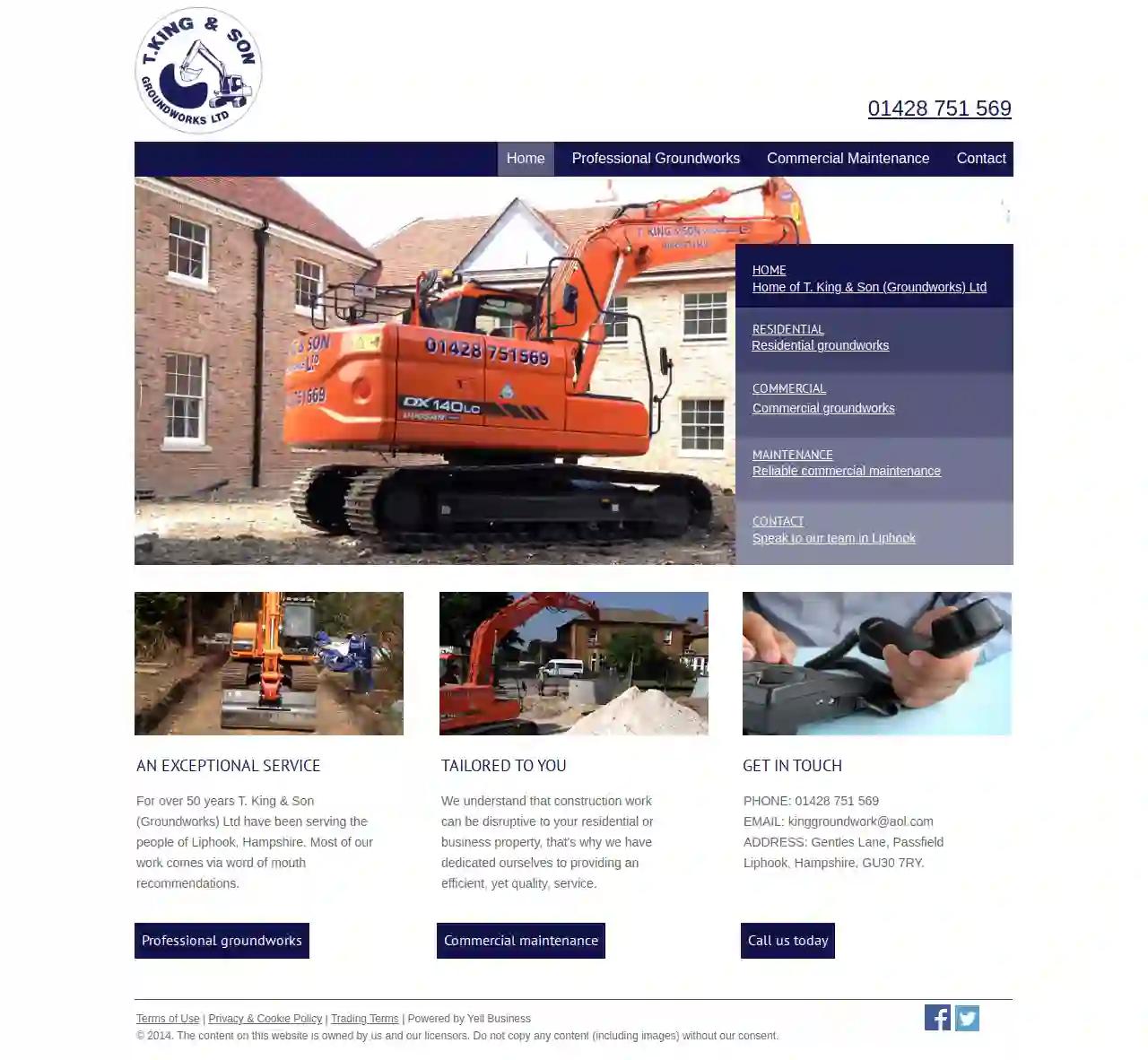Dirt Contractors Worthing
Find the best Dirt Contractors in Worthing
Receive multiple Dirt Contractor quotes for your project today! Compare profiles, reviews, accreditations, portfolio, etc... and choose the best deal.

T King & Son Groundwork Ltd
1Gentles Lane, Passfield, Liphook, GU30 7RY, GBT. King & Son (Groundworks) Ltd: Your Trusted Groundworks Partner in Hampshire For over 50 years, T. King & Son (Groundworks) Ltd has been a leading provider of groundworks services in Liphook, Hampshire. We've built a strong reputation for delivering exceptional quality and efficiency, earning the trust of countless satisfied customers. Our commitment to excellence is evident in every project we undertake, from residential to commercial groundworks and maintenance. We understand that construction work can be disruptive, which is why we prioritize minimizing disruption and delivering projects on time and within budget. Our team of skilled professionals is dedicated to providing a seamless and hassle-free experience for our clients. Whether you're building your dream home, expanding your business, or need reliable commercial maintenance, T. King & Son (Groundworks) Ltd is your trusted partner. We're committed to exceeding your expectations and delivering results that stand the test of time.
- Services
- Why Us?
- Gallery
Get Quote
Dancy Building Contractors Limited
55 reviewsUnit 1, The Old Dairy, Steyning, BN44 3DZ, GBDancy Building Contractors: Modern Building, Traditional Values Dancy Building Contractors is a reputable and experienced building company based in Steyning, West Sussex. We are committed to delivering high-quality building services with a focus on traditional values and modern construction techniques. Our team of skilled professionals is dedicated to providing exceptional craftsmanship and customer service, ensuring your project is completed to the highest standards. We understand that building projects can be complex and require careful planning and execution. That's why we take a collaborative approach, working closely with our clients to understand their needs and vision. We provide clear communication, transparent pricing, and a commitment to delivering projects on time and within budget. Whether you're planning a home extension, loft conversion, or a complete new build, Dancy Building Contractors has the expertise and experience to handle your project with confidence. We are proud of our reputation for quality, reliability, and customer satisfaction. Contact us today to discuss your building project and let us help you bring your vision to life.
- Services
- Why Us?
- Gallery
Get Quote
A P Meredith & Son Ltd
1Worthing, GBA.P. Meredith & Son: Your Complete Building and Decorating Specialists A.P. Meredith & Son is a family-run business established by Andy Meredith in 1984. Since its inception, we've built a reputation for meticulous attention to detail, clear communication throughout projects, unwavering reliability, and delivering exceptionally high-quality finished projects. Experienced and Knowledgeable Professionals We undertake projects of all sizes across Sussex and the South East, from large-scale building works and full refurbishments to comprehensive property maintenance, small handyman jobs, and freshen-ups for landlords when tenants move out. Our Services Extensions: We can handle everything from architectural drawings to structural calculations, collaborating with trusted architects and structural engineers. Loft Conversions: We specialize in new cut and pitched roofs, carpentry, structural alterations, and steelwork. Kitchens & Bathrooms: Refurbishments including design services and full project management with exceptional communication. Decorating: High-end, flawless decorating service, including spray finishing. External decorating, including full repair and restoration of period properties. Tiling: Floor and wall tiling specialists, using a wide range of materials. Full wet room installations, Victorian pathways, and fully mitred external corners as standard. Roofing: All aspects of roofing works and associated leadwork. Featured Building Projects Explore some of our recent projects. For a more in-depth look at our work, visit our portfolio page.
- Services
- Why Us?
- Our Team
- Testimonials
- Gallery
Get Quote
Gibson Groundworks & Construction Ltd
32 reviewsWorthing, GBWHO WE ARE Gibson Groundworks and Construction is a local, family run business whose Director, Peter Gibson, has over 20 years industry experience. We pride ourselves on our professionalism, reputation and innovative approach to any work that we undertake. In order to ensure that we maintain our high standards the management and staff undergo constant training and development so that we remain aware of the latest changes to building industry techniques. In addition to this we have built up good relationships with all our suppliers so that we can make sure we provide the best possible value for money. OUR HAPPY CUSTOMERS We have used Pete and his team on several occasions and have yet to find any fault at all. Project completed on time and to cost, neat, tidy and professional. - Mr M, Worthing Excellent job completed by Pete and his team, all rubbish removed and left good as new at the end of the day. Was expecting this job to take 2 days at least but Pete managed to dig up the old drive, uncover the existing drainage pipes, connect the new and make good all in a day. Very happy with the work and would highly recommend. - Mr C, Worthing
- Services
- Why Us?
- Testimonials
- Gallery
Get Quote
Over 11,537+ Excavation Contractors on our directory
Our excavation experts operate in Worthing & surrounding areas!
ExcavationHQ has curated and vetted the Best Excavation Contractors near Worthing. Find a top & trustworthy pro today.
Frequently Asked Questions About Dirt Contractors
- Plant Selection: Understanding your soil's pH and nutrient levels helps you choose plants that will thrive in those conditions.
- Fertilizer Recommendations: Soil tests reveal nutrient deficiencies, allowing you to apply appropriate fertilizers to meet plant needs.
- Soil Amendments: Identify soil imbalances, such as compaction or high clay content, and recommend amendments to improve soil structure and drainage.
- Construction Projects: Assess soil bearing capacity and other properties to ensure the stability and safety of foundations and other structures.
- Environmental Assessments: Detect potential soil contamination and determine the need for remediation.
- Project Scope: The size and complexity of the project, including the volume of dirt to be moved, the distance for hauling, and the type of services required.
- Dirt Type: Different dirt types have varying costs based on availability and demand. Topsoil is typically more expensive than fill dirt.
- Location: Costs may differ depending on the contractor's location and the accessibility of the project site.
- Equipment Needed: Specialized equipment, such as excavators, bulldozers, or dump trucks, can influence the overall cost.
- Labor Costs: The number of workers and their hourly rates will affect the labor portion of the cost.
- Excavators: Versatile machines with a digging arm and bucket, used for excavation, trenching, loading trucks, and demolition.
- Bulldozers: Heavy machines with a large blade at the front, used for pushing and moving dirt, clearing land, and grading.
- Skid Steers: Compact, versatile machines with various attachments, including buckets, forks, and augers, used for digging, loading, grading, and more.
- Dump Trucks: Heavy-duty trucks designed for hauling dirt, gravel, and other bulk materials. Sizes vary based on carrying capacity.
- Graders: Machines with a long blade used for precise leveling and shaping of land surfaces, often used for road construction and site preparation.
- Compactors: Equipment used to compress soil, including plate compactors, rollers, and vibratory tampers, essential for achieving soil stability.
What is a soil test, and why is it important?
How much does it cost to hire a dirt contractor?
What are some common dirt contracting equipment?
What is the difference between topsoil and fill dirt?
Topsoil: The uppermost layer of soil, characterized by its rich organic matter content, nutrients, and dark color. It's essential for supporting plant growth and is commonly used for gardening, landscaping, and lawn establishment.
Fill Dirt: Primarily composed of subsoil or excavated materials, generally lacking the organic matter and nutrients found in topsoil. It's typically less fertile and used for structural purposes, such as filling in low areas, leveling ground, or creating raised beds.
Understanding the difference between topsoil and fill dirt is crucial for choosing the appropriate soil type for your specific project needs.
What is a soil test, and why is it important?
- Plant Selection: Understanding your soil's pH and nutrient levels helps you choose plants that will thrive in those conditions.
- Fertilizer Recommendations: Soil tests reveal nutrient deficiencies, allowing you to apply appropriate fertilizers to meet plant needs.
- Soil Amendments: Identify soil imbalances, such as compaction or high clay content, and recommend amendments to improve soil structure and drainage.
- Construction Projects: Assess soil bearing capacity and other properties to ensure the stability and safety of foundations and other structures.
- Environmental Assessments: Detect potential soil contamination and determine the need for remediation.
How much does it cost to hire a dirt contractor?
- Project Scope: The size and complexity of the project, including the volume of dirt to be moved, the distance for hauling, and the type of services required.
- Dirt Type: Different dirt types have varying costs based on availability and demand. Topsoil is typically more expensive than fill dirt.
- Location: Costs may differ depending on the contractor's location and the accessibility of the project site.
- Equipment Needed: Specialized equipment, such as excavators, bulldozers, or dump trucks, can influence the overall cost.
- Labor Costs: The number of workers and their hourly rates will affect the labor portion of the cost.
What are some common dirt contracting equipment?
- Excavators: Versatile machines with a digging arm and bucket, used for excavation, trenching, loading trucks, and demolition.
- Bulldozers: Heavy machines with a large blade at the front, used for pushing and moving dirt, clearing land, and grading.
- Skid Steers: Compact, versatile machines with various attachments, including buckets, forks, and augers, used for digging, loading, grading, and more.
- Dump Trucks: Heavy-duty trucks designed for hauling dirt, gravel, and other bulk materials. Sizes vary based on carrying capacity.
- Graders: Machines with a long blade used for precise leveling and shaping of land surfaces, often used for road construction and site preparation.
- Compactors: Equipment used to compress soil, including plate compactors, rollers, and vibratory tampers, essential for achieving soil stability.
What is the difference between topsoil and fill dirt?
Topsoil: The uppermost layer of soil, characterized by its rich organic matter content, nutrients, and dark color. It's essential for supporting plant growth and is commonly used for gardening, landscaping, and lawn establishment.
Fill Dirt: Primarily composed of subsoil or excavated materials, generally lacking the organic matter and nutrients found in topsoil. It's typically less fertile and used for structural purposes, such as filling in low areas, leveling ground, or creating raised beds.
Understanding the difference between topsoil and fill dirt is crucial for choosing the appropriate soil type for your specific project needs.